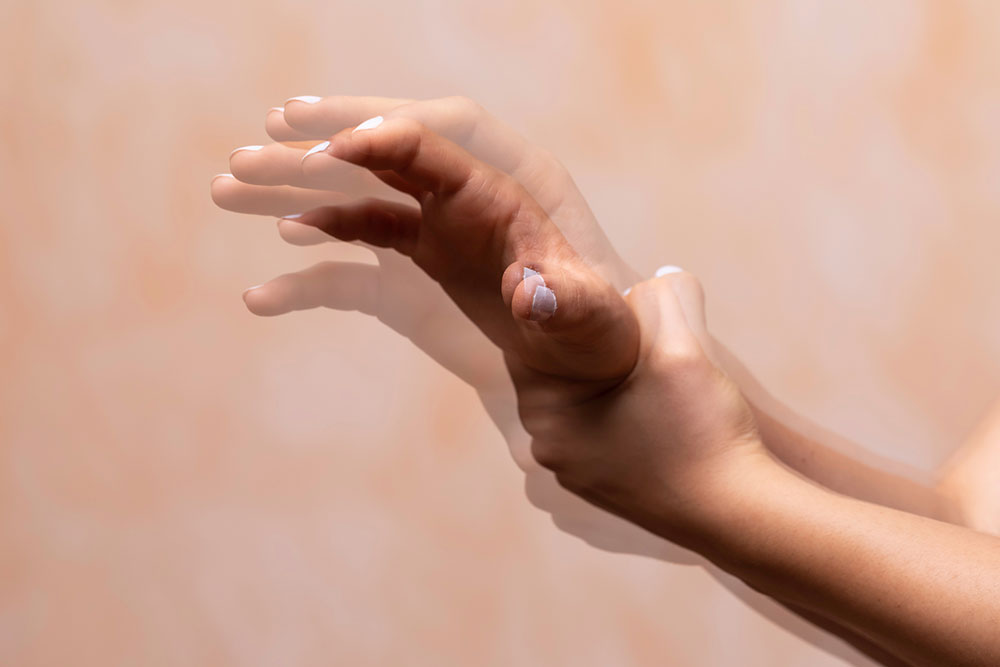7 causes of involuntary hand movements

Health conditions can cause visible symptoms, one of which is involuntary hand movements. The movement, often manifesting as tics or tremors, is a result of issues affecting the nerves or muscles. It is important to get such symptoms examined by a doctor immediately, especially when one often notices involuntary movements without an apparent cause. The doctor may conduct a series of tests to determine the cause, which could be one of the following conditions:
1. Tardive dyskinesia (TD)
TD is a neurological condition that develops in the brain as a side effect of prescriptions necessary to treat psychiatric disorders and nausea. The prescription treatment in question blocks the dopamine receptors in the brain. The lack of the chemical dopamine may interfere with muscle function, causing mild to severe twitching, shaking, or jerking in the hands. Studies show that about 50% of those taking such prescription options might develop TD over the course of their treatment. While the condition might last for a long period, certain management options can slow down or stop its progression. Other symptoms associated with tardive dyskinesia might include uncontrolled muscle movement in the feet, face, or torso. Additionally, one might experience involuntary blinking, tongue movements, and other unintentional, uncontrollable movements.
2. Ataxia
Ataxia is a degenerative disorder that affects the brain, brainstem, or spinal cord. So, it can cause symptoms such as involuntary movements or lack of coordination in the hands, arms, or legs. These movements can be jerky. Other symptoms of ataxia include issues with walking and maintaining balance, speech and swallowing problems, and involuntary eye movements. Several issues can contribute to ataxia, like strokes, tumors, brain degeneration, multiple sclerosis, and genetic disorders. Treatments for the condition may depend on the cause. Further, one might need adaptive devices, such as canes or walkers, to maintain mobility and independence when dealing with ataxia. Here, physical therapy may also be required to help one deal with the symptoms.
3. Huntington’s disease
Another common cause of involuntary hand movements is Huntington’s disease—an inherited disorder that causes nerve cells in parts of the brain to gradually break down and perish. As a result, the disease attacks areas of the brain that help control voluntary movement. Those with Huntington’s disease may notice uncontrolled movements in their fingers, which might be a sign of chorea. The symptoms could worsen when one is nervous or distracted. Moreover, the movements may become more extreme and obvious. This symptom might develop in middle-aged people with the disease but is sometimes noticeable in children affected by the condition. While there is no treatment to cure HD, prescription treatment can help one manage the symptoms.
4. Multiple system atrophy (MSA)
MSA is a rare, degenerative neurological disorder that affects the body’s key functions, like blood pressure and motor control. It may affect several parts of the body, with symptoms usually developing in later years, around the age of 50 to 60. MSA leads to deterioration in different brain areas, and symptoms depend on which part is affected. If the disease affects the cerebellum, one might experience issues with coordinated movements, including those involving the hands. One may also experience other symptoms like trouble controlling the bladder, rapid eye movement behavior disorder, decreased sweating, and vision problems. Those affected by MSA may also experience autonomic dysfunction signs like sleep apnea, dry mouth, slowed digestion, and constipation.
5. Parkinson’s disease
Parkinson’s disorder is caused by degeneration of nerve cells in the part of the brain called the substantia nigra. This region is responsible for controlling various movements. Once the nerve cells are impaired, they lose the ability to produce the chemical dopamine, which subsequently leads to issues like involuntary hand movements. Other signs of Parkinson’s to look out for include changes in voice, tremors, drooling, stooped flexed posture, and reduced facial expressions. Parkinson’s is often treated with the help of prescription options that relieve the symptoms. Surgery is also an option when other treatment options are ineffective. Here, deep brain stimulation (DBS) is a procedure used to treat symptoms of the condition in its advanced stages.
6. Hand dystonia
Hand dystonia is characterized by excessive, involuntary muscle contractions in the fingers, forearm, hand, and sometimes the shoulder. The symptoms are noticeable when one is engaging in a task that requires fine motor coordination of the hand and arm muscles. Hand dystonia includes a group of disorders called occupational hand dystonias that affect golfers, typists, or musicians and develop during specific activities that require the use of the hand. Further, one might develop a writer’s cramp—a form of dystonia that develops when one is writing. Experts believe that this phenomenon is a result of improper signals in the nervous system that cause muscles to contract involuntarily. Here, prescriptions or surgery are common options for managing the condition.
7. Wilson’s disease
Wilson’s disease is a rare inherited disorder that causes copper to accumulate in the liver, brain, and other vital organs. Most people with the disease are diagnosed between the ages of 5 and 35, but it might also affect people belonging to other age groups. Copper plays a crucial role in the development of healthy nerves, collagen, bones, and skin pigment melanin. Usually, the element is absorbed from food, and its excess is excreted through bile—a substance produced by the liver. However, in those with Wilson’s disease, copper is not eliminated properly and instead accumulates to a dangerous level that may result in symptoms such as uncontrolled movements or muscle stiffness in the hands and other parts of the body. One may also experience signs like fatigue, jaundice, and fluid buildup in the legs or abdomen. The condition is treatable when diagnosed early.
One should consult a doctor upon noticing involuntary hand movements in order to understand the precise cause and seek appropriate treatment for addressing it.